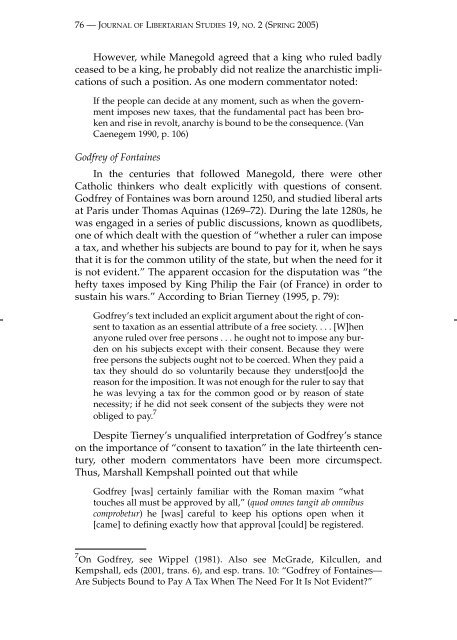Quod Omnes Tangit
Quod Omnes Tangit
Quod Omnes Tangit
Create successful ePaper yourself
Turn your PDF publications into a flip-book with our unique Google optimized e-Paper software.
76 — JOURNAL OF LIBERTARIAN STUDIES 19, NO. 2 (SPRING 2005)<br />
However, while Manegold agreed that a king who ruled badly<br />
ceased to be a king, he probably did not realize the anarchistic implications<br />
of such a position. As one modern commentator noted:<br />
If the people can decide at any moment, such as when the government<br />
imposes new taxes, that the fundamental pact has been broken<br />
and rise in revolt, anarchy is bound to be the consequence. (Van<br />
Caenegem 1990, p. 106)<br />
Godfrey of Fontaines<br />
In the centuries that followed Manegold, there were other<br />
Catholic thinkers who dealt explicitly with questions of consent.<br />
Godfrey of Fontaines was born around 1250, and studied liberal arts<br />
at Paris under Thomas Aquinas (1269–72). During the late 1280s, he<br />
was engaged in a series of public discussions, known as quodlibets,<br />
one of which dealt with the question of “whether a ruler can impose<br />
a tax, and whether his subjects are bound to pay for it, when he says<br />
that it is for the common utility of the state, but when the need for it<br />
is not evident.” The apparent occasion for the disputation was “the<br />
hefty taxes imposed by King Philip the Fair (of France) in order to<br />
sustain his wars.” According to Brian Tierney (1995, p. 79):<br />
Godfrey’s text included an explicit argument about the right of consent<br />
to taxation as an essential attribute of a free society. . . . [W]hen<br />
anyone ruled over free persons . . . he ought not to impose any burden<br />
on his subjects except with their consent. Because they were<br />
free persons the subjects ought not to be coerced. When they paid a<br />
tax they should do so voluntarily because they underst[oo]d the<br />
reason for the imposition. It was not enough for the ruler to say that<br />
he was levying a tax for the common good or by reason of state<br />
necessity; if he did not seek consent of the subjects they were not<br />
obliged to pay. 7<br />
Despite Tierney’s unqualified interpretation of Godfrey’s stance<br />
on the importance of “consent to taxation” in the late thirteenth century,<br />
other modern commentators have been more circumspect.<br />
Thus, Marshall Kempshall pointed out that while<br />
Godfrey [was] certainly familiar with the Roman maxim “what<br />
touches all must be approved by all,” (quod omnes tangit ab omnibus<br />
comprobetur) he [was] careful to keep his options open when it<br />
[came] to defining exactly how that approval [could] be registered.<br />
7 On Godfrey, see Wippel (1981). Also see McGrade, Kilcullen, and<br />
Kempshall, eds (2001, trans. 6), and esp. trans. 10: “Godfrey of Fontaines—<br />
Are Subjects Bound to Pay A Tax When The Need For It Is Not Evident?”
















